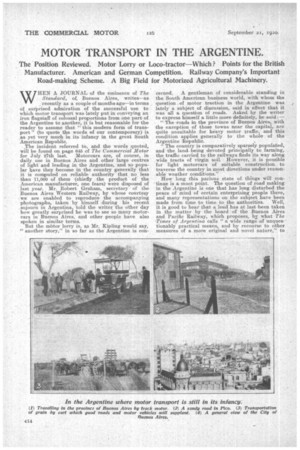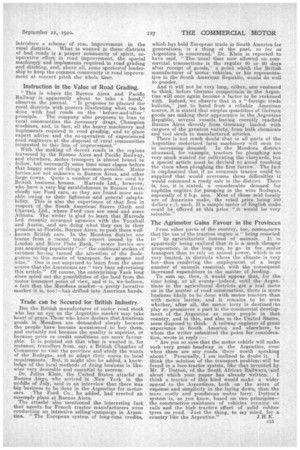MOTOR TRANSPORT IN THE ARGENTINE.
Page 14

Page 15

If you've noticed an error in this article please click here to report it so we can fix it.
The Position Reviewed. Motor Lorry or Loco-tractor—Which ? Points for the British Manufacturer. American and German Competition. Railway Company's Important Road-making Scheme. A Big Field for Motorized Agricultural Machinery.
WHEN A JOURNAL of the eminence of The Standard, of Buenos Aires, writes—as ;recently as a couple of months ago—in terms of surprised admiration of the successful use to which motor transport was lately put in conveying an iron flagstaff of colossal proportions from one part of the Argentine to another, it is but reasonable for the reader to assume that "this modern form of transport" (to quote the words of our contemporary) is as yet very much in its infancy in the great South *American Republic. The incident referred to, and the words quoted, will be found on page 645 of The Commercial Motor for July 21-th last. Motorcars are, of course, in daily use in Buenos Aires and other large centres of light and leading in the Argentine, and so popular have they become in the country generally that it is comiputed on reliable authority that no less than 11,000 of them (chiefly the product of the American manufacturer, one fears) were disposed of last year. Mr. Robert Graham, secretary of the Buenos Aires Western Railway, by whose courtesy we are enabled to reproduce the accompanying photographs taken by himself during his recent sojourn in Argentina, told the writer the other day how iireatly surprised he was to see so many motorcars in Buenos Aires, and other people have also spoken in similar terms.
But the mbtor lorry is, as Mr. Kipling would say, "another story," in so far as the Argentine is con
cerned. A gentleman of considerable standing in the South American business world, with whom the question of motor traction in the Argentine was lately a subject of discussion, said in effect that it was all a. question of roads. Asked by the writer to express himself a little more definitely, he said :— "The roads in the province of Buenos Aires, with the exception of those towns near the capital, are quite unsuitable for heavy motor traffic, and this condition applies generally to the whole of the Argentine Republic. "The country is comparatively sparsely populated, and the land being devoted principally to farming, the traffic carried to the railways finds its way along wide tracts of virgin soil. However, it is possible for light motorcars of suitable construction. to traverse the country in most directions under reasonable weather conditions..'
How • long this parlous state of things will continue is a, moot point. The question of road making in the Argentine is one that has long disturbed the peace of mind of certain enterprising people there, and many representations on the subject have been made from time to time to the authorities. Well, it is good to hear that a lead has at last been taken in the matter by the board 'of the Buenos Aires and Pacific Railway, which proposes, by what The -Times of Argentina calls "a wide range of unquestionably practical means, and by recourse to other measures of a more original and novel nature," to
introduce a scheme of mass improvement in the rural districts. What is wanted in these distriets of bad roads is a proper community of spirit, cooperative effort in road improvement, the special machinery and implements required, in road grading and ditching, and, above all, some speciestof leadership to keep the common eommunity in road improvement at concert pitch the whole time.
Instruction in the Value of Road Grading.
This is where the Buenos Aires and Pacific Railway is apparently about to take a hand," observes the journal. "It proposes to placard the rural districts with posters illustrating what can be done with bad roads on the ' before-and-after ' principle. The company also proposes to loan to rural communities the necessary drags, Champion machines, and, in fact, all the heavy machinery and implements required in road grading, and to place expert advice and the co-operation of experienced road enginee.rs.at the disposal of rural communities interested in this line of improvement."
With the making of decent roads in the regions • traversed by the Buenos Aires and Pacific Railway, and elsewhere, motor transport is almost bound to , follow, but necessarily some time must' elapsebefore that liappy state of things becomes possible. Motor lorries are not unknown in Buenos Aires, and other large towns. Quito a numberof them are used by
British business houses. Harrods Ltd., however, who have a very big establishment in Buenos Aires,. chiefly use Ford care' as they are found more suitable owing to their lightness and general adaptability. This is also the experience of that firm in respect of the South American Stores (Gath and Chaves), lad., where Ford cars are used and some Alhions. The writer is glad to learn that Harrods Ltd. recently arranged agencies with the Vauxhall and Austin, and are doing what. they can in their premises at Florida, Buenos Aires, to push these :wellknown British cars. In the Mendoza district. one learns -from a 'ecent trade report issued by the London and River Plate Bank, motor lorries are just acquiring popularity "—" the continual strikes of seamen having turned the. attention of the. Bodegueros to this means of transport for grapes and .wine." One is not surprised to learn from the same source that the Americans are " very busy advertising this article." Of course, the enterprising Yank long since spied out the possibilities of the land from the motor transport point of view, and it is, we believe, a fact that the Mendoza market—a pretty lucrative market it is, too !—IntS. drifted into American hands.
Trade can be Secured for British Industry.
But the British manufacturer of motor road stock who has an eye on the Argentine market may take heart of grace. Those who know aeclare that American goods in Mendoea are demanded simply because the people have become accustomed to buy them, and certainly not because the quality is superior, or because price or credit conditions are more favourable. It is pointed out that what is wanted is, for instance, travellers from, say; a British Chamber of Commerce to visit the province and study the wants of the Bodegas, and so adapt their wares to local requirements. But, it might also be added, a knowledge of the local methods of doing business is likewise very desirable and essential to success.
Dr. Julius Klein, the United States attaché at Buenos Aires, who arrived in New York in the middle of July, said in an interview that there was big business to be done in the Argentine for motorcars. The Ford Co., he added, had erected an assemply Plant at Buenos Aires.
The attaché also mentioned the interesting fact. that agents for French tractor manufacturers were conducting an intensive selling Icampaign in Argentina. "The European system of long-time credits, which has held European trade in South America for generations, is a thing of the past, so tar as Argentina is concerned," Dr. Klein is reported to have said, "The usual time now allowed on commercial transactions is the regular 60 or 90 days after receipt of goods," a point which the British manufacturer of motorvehicles, or his representative in the South American Republic, would do well to ponder.. And it will not be very long, either, one ventured to think, before German competition in the Argentine will once again becoine a factor to be reckoned with. Indeed, we observe that in a "foreign trade bulletin," just to hand from a reliable American source, it is stated that surplus quantities of Gellman' goods are making their appearance in the Argentine Republic, several vessels, having recently reached Buenos Aires directly from .Germany leaded with cargoes of the greatest variety, from bulk chemicals and tool steels to manufactured articles.
There is not much doubt that in all parts of the Argentine motorized farm machinery will soon be in increasing demand. In the Mendoza district aforesaid, for -example, tractors for ploughing are very niuch wanted for cultivating the vineyards, but a special article must be devised to avoid touching the vines when ploughing the first furrow. The fact is emphasized that if an economic tractor could be supplied that would overcome these difficulties it would command a ready sale in the district; There is, too, it is stated, a considerable demand for naphtha. engines for pumping in the wine. Bodegas, especially of 2 h.p. size. Most of those sold locally are of American make, the retail price being aao dollars c./1. each. If a sample motor of English make could be offered at this price "it would be very saleable."
The Agrimotor Gains Favour in the Provinces
From other parts of the country, too comessnews that the use of the traction engine is " being resorted to" by agriculturists instead of animals. It is apparently being realized that it is a. much cheaper proposition, in the long run, to go in for motor transport than to rely on. animal power, which-is so very limited, in districts where the climate is very hot—thus rendering the employment of a large number of animals essential, with the consequent increased expenditure in the matter of feeding.
To sum up, then, it would appear that, for the time being, at all events—indeed, until the. Argem tines in the agricultural districts get a real move on in the matter of road construction, there is more business likely to be•done with motor tractors than with motor lorries, and it remains to be seen whether,. after all, the motor lorry is destined ..:to play so prominent a part in the commercial development of the Argentine as. many people in that country, and in this, 'and also in the United States, seem disposed to think. A railway engineer of great experience in South America and elsewhere, to whom the writer submitted the point for consideration, wrote in reply :— " Are you so sure that the motor vehicle will make such very great headway in the Argentine, even' when there are any roads there worth speaking ,about I Personally, I am inclined to doubt it. I think the eolution of the transport problenawill be found in a loco-tractor system, like that invented by Mr. F. Dutton, of the South African Railways, :and about which your paper has already written. I think a tractor of this kind would make a wider appeal to the Argentines, both on the score of expense and simplicity in the laying down, than the more costly and ponderous motor lorry. Dutton's system is, as you know, based on two principles— the constructive resistance of vehicles running on rails and the high tractive effort of solid rubber tyres on road. Just the thing, to my mind, for a
country like the Argentine." J.H.K.








































